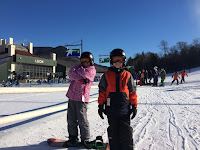During the last few days of the February School Vacation, my family and I spent a few days in Lincoln, NH. As a part of this trip, my two children (ages 10 and 7) attempted snowboarding for the first time. During my journey as a parent, I have come to know that I often learn a lot about myself and life by watching my children learn new things. This trip was no different.
Happiness does not come from the conditions - I have been skiing or snowboarding for over 20 years and in that time have skied all over New England and Colorado. In those travels, I have experienced all sorts of snow conditions and have self-admittedly developed a bit of snobbery about the snow conditions. I am always comparing the conditions to some of the best days I have experienced and if they don't live up, I am disappointed.
I think part of this is natural and occurs to all of us. Whether it is the snow conditions or some
other aspect of our lives, I think we all sometimes find ourselves measuring the quality of an experience by the conditions we find ourselves in.The day my kids learned to snowboard the conditions were tough; the mountain was crowded, icy underneath and covered with hard-packed, granular man-made snow. These conditions were making myself and many other seasoned skiers grumpy. However, as I picked my kids up from their lessons at the end of the day, they had smiles from ear to ear and all the talk for the rest of the weekend was about how much they loved snowboarding. They helped remind me that our enjoyment of life events and the joy we find in general need not be tied to the conditions surrounding those events. Rather, my kids showed me that the experience itself is where the fun and smiles are.
Learning can hurt sometimes - Anyone that has watched someone learn to snowboard knows that it is a lot like watching a toddler learn to walk... a lot of time is spent picking yourself up off the ground. There is no denying it, learning new things can often be very difficult. Some things are harder to learn than others and the process can sometimes be frustrating and painful.
For some children it may be learning to read that they are finding difficult, or building a strong
sense of number. Other children may experience hurt feelings as they are learning to interact with their peers socially. Regardless of the learning situation, my children continue to show me that learning includes difficult lessons sometimes and that as a parent, as much as I want to, I can not protect them from all those instances.
Easy things can become difficult when new challenges are added - For my birthday this year, one of my family members generously gave me a GoPro camera. I brought it to the mountain to capture all sort of video of my kids' early experiences with snowboarding. Being new to using the camera I do not think I attached the bracket correctly to my helmet, as it fell off part way through the day. So when I went to pick up my kids from their lesson and take them down a trail, I had to use my hand to hold the camera and film them while snowboarding next to them.
Now, while I am certainly not going to be competing in the Olympics, I do consider myself a pretty competent snowboarder. However, the second I tried to add the skill of video recording to snowboarding, it was as if my legs forgot what they were supposed to do. It is funny how sometimes the simplest change to an activity we are familiar with can make it feel completely new and unfamiliar.
In retrospect, I should not have been surprised by this as it is something that we see all the time in education. A student may be doing just fine with their reading progress in their early years. She may be able to read grade appropriate books with fluency, make meaning of the text and use multiple strategies to figure out unfamiliar words. Then she may encounter something new (like dialogue for example) and for a short
period of time present like a "struggling reader" as she learns how to assimilate this new print concept into her reading repertoire. However, with a little patience and quality coaching from a teacher, the child is able to integrate this new concept into her reading and return to the same level of fluency and meaning making.
This is the learning process and it never ends. Psychologist Lev Vygotsky described this area just beyond what we currently know and understand the Zone of Proximal Development (ZPD) and determined that it is in the ZPD, with proper support and coaching, is where the highest levels of learning occur. Simply put, struggle is part of the learning process and our role as adults is to provide just enough support to students to help them muddle through until they have mastered the skill/concept themselves.
Who knows what adventure next awaits the Smith clan, but I am sure whatever it is, I will leave it having learned more from my kids than I will have probably taught them.




No comments:
Post a Comment